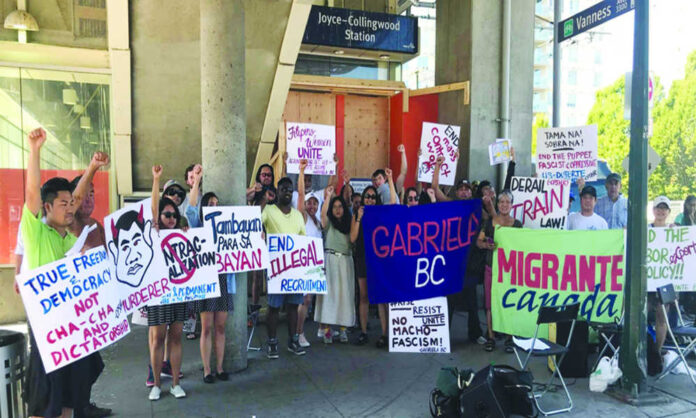The discontent and the outrage against the Duterte government and its anti-people policies were heard loud and clear among the overseas Filipino groups and progressive Canadians who are concerned with what is happening in the Philippines, most especially the continuing human rights violations and the increasing fascism and militarization against the most vulnerable sectors of Philippine society, the indigenous communities, workers and peasants, women, jeepney drivers, church people, human rights defenders, development workers, and others.
Last Sunday, July 22, at least 50 Filipinos and concerned Canadians gathered outside the Joyce – Collingwood Skytrain Station, a busy intersection for bus and train passengers in East Vancouver to hold the United People’s SONA . The Vancouver rally was part of the many mass actions in the Philippines and around the globe to show the Duterte government it has not made any changes that would benefit the people but has instead plunged the economy into deeper economic crises and has trampled the nation’s sovereignty even more deeply.
The early afternoon rally was organized by Filipino groups: Canada Philippines Solidarity for Human Rights, Migrante BC, and GABRIELA BC. They were joined by members of the JustPeace Committee, the International League of Peoples’ Struggle (ILPS) in Canada, the Vancouver Area Network of Drug Users (VANDU), and the East Indian Defence Committee who delivered solidarity messages in support of the rally and the people’s movement for change in the Philippines. Aiyanas Ormond of the ILPS said that “today, all of us are united in our solidarity with the Filipino people who are standing up to and resisting the brutal policies of the repressive Duterte regime backed by the U.S.”
The rallyists held up placards that reflected the pressing issues faced by the Filipino people. These included the continuing extra judicial killings and arbitrary arrests and detentions, the blatant violations on the Philippine’s national sovereignty by the US and China, the exploitative policy of labour contractualization, the continuing economic crises marked by low wages, rise in prices of basic commodities and utilities, Duterte’s macho-fascism seen in his hatred and disrespect for women, the demand for a just and lasting peace, and the continuing martial law in Mindanao.
Passersby, particularly the non-Filipinos, took the leaflets and some asked what the rally was about, because Duterte has made international waves with the thousands of Filipinos killed, without due process, in his war on drugs. There were many motorists who honked their horns in support. Many rolled down their windows to take the leaflets to read.
The women in the rally applauded the GABRIELA BC in its strong declaration that Filipino women in the various sectors who fight for their lives every day are “fighting women [who] intimidate Duterte. Otherwise, he would have no reason to aim such fanatically violent comments towards them, or encourage violence against them. The escalation of his aggressive comments reveals that despite his best efforts to demean, disrespect, and degrade women, they continue to oppose and fight against him, against misogyny, and against their imposed role in society as commodities and sex objects.”
The chanting and singing at the end of the program reflected the calls of the United People’s SONA: Tama na! Sobra na! Wakasan na! Enough is Enough! End Tyranny Now!
Canada Philippines Solidarity for Human Rights presented the important truth of what is happening and what will happen in the Philippines: “It is the people alone, as we can see in these days of actions leading to the SONA, who can achieve fundamental change towards a society which guarantees peace and social justice. Tama na! Sobra na! Wakasan na!”
More than ever, the need to have conversations and discussions on what is happening in the Philippines is more important than ever. Our ties to the Philippines are strong and made stronger when we know that bad things are happening and that we can do something as overseas Filipinos. This is not about one man, it is about the people (and I don’t mean those who live in gated communities) but the workers and farmers, the indigenous communities, the urban poor, the women whose lives are on the line, and yet are all organizing and working for change in the face of great risks.



